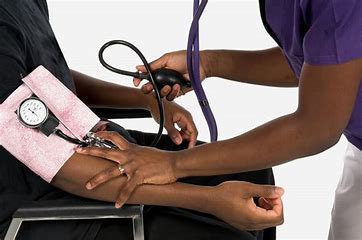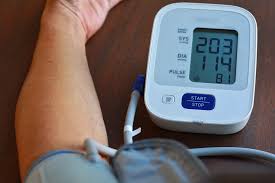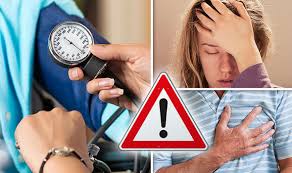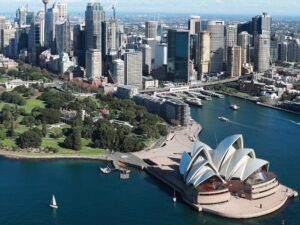
Learn how to control high blood pressure symptoms with lifestyle changes, medication, and natural remedies effectively.
What is high blood pressure, and how to control the symptoms and what are the treatments for high blood pressure?

How to control the symptoms of high blood pressure and what is its treatment?
Hypertension, another name for high blood pressure is elevated blood pressure.
Elevated blood pressure, commonly referred to as hypertension, is a rise in blood flow and a corresponding rise in pressure.
Depending on your activity, your blood pressure changes throughout the day.
High blood pressure may become diagnosed if readings are usually higher than usual.
High blood pressure usually develops slowly.
Failure to exercise is usually a factor in poor lifestyle choices.
Certain medical conditions, such as obesity and diabetes, can increase the likelihood of developing high blood pressure.
High blood pressure can also result from pregnancy.
You’re young and healthy – so does it matter if your doctor is concerned about your blood pressure?
Even as a young adult, you are not too young to experience the effects of high blood pressure.
Even healthy people older than 20 have raised or high blood pressure.
Even though there are no visible symptoms of high blood pressure, it does not mean to ignore it.
While it may not seem like it, high blood pressure gradually harms your body and raises your chance of major medical issues.
That’s why high blood pressure is called the silent killer.
In the other paragraphs, we’ll talk about treatment and symptoms.
Categories of High Blood Pressure:
Normal Blood Pressure:
Lower than 120/80 mmHg
Elevated Blood Pressure:
Between 120-129/80 mmHg
High pressure, stage 1:
Between 130-139/80-90 mmHg
High BP, stage 2:
140/90 mmHg or higher
What are the symptoms and indicators of high blood pressure?
Symptoms of high blood pressure are rare. High blood pressure symptoms include the following:
Some of those indicators are:

1. Vision distortion,
2. Nosebleeds,
3. Breathing difficulties
4. Chest discomfort
5. Dizziness,
6. Headaches
7. Echoing in the ears
8. Irregular heartbeats
What happens if high blood pressure is not under control?
1. Atherosclerosis of the arteries:
Healthy arteries are strong, flexible, and elastic. Their inner lining is smooth, allowing blood to flow easily and delivering nutrients and oxygen to vital organs and tissues.
Moreover, high blood pressure (hypertension) gradually increases the load of blood flowing through the arteries.
2. Heart Problems and Cardiac Arrest:
High blood pressure can damage your arteries by making them less flexible, reducing the flow of blood and oxygen to your heart, and leading to heart disease.
Cardiac Arrest:
In general, high blood pressure affects the arteries, which may limit blood flow to the heart muscle.
Heart Problems:
High blood pressure can cause the heart to expand and fail to provide blood to the body due to the increased workload.
3. Kidney Disease.
People who have diabetes, high blood pressure, or both are more likely to develop chronic kidney disease than people who do not have these diseases.
With this in mind high blood pressure can harm the arteries around the kidneys, impairing their ability to filter blood properly.
Some more threatening damages could be:
Loss of vision:
Then, high blood pressure can strain or damage the blood vessels in the eyes.
Sexual impairment:
Increased blood pressure may lead to erectile dysfunction in males and reduced sexual desire in females.
Angina:
High blood pressure can eventually lead to heart disease, especially microvascular disease (MVD).
Similarly, Angina, often known as chest discomfort, is a common complaint.
Peripheral artery disease (PAD):
High blood pressure can induce atherosclerosis, which causes restricted arteries in the legs, arms, stomach, and brain, causing pain or weariness.
High blood pressure can lead to atherosclerosis, which causes arteries in the legs, arms, stomach, and brain to become blocked, causing pain or fatigue.
In summary, hypertension is often managed or reduced by consuming nutritious foods, keeping a healthy body weight, engaging in regular physical activity, drinking moderately, and avoiding smoking.
Some of the things(remedies) that you need to control your symptoms of blood pressure include:
1. Physical activity can help you enhance your health:
Moreover, regular activity strengthens the heart.
Additionally, a stronger heart can pump more blood with less effort. As a result, we thereby reduce the force on the arteries.
It lowers blood pressure.
Millimeters of mercury (mm Hg) serve as the unit for gauging blood pressure.
In the same vein, a blood pressure measurement comprises two figures. The upper digit indicates systolic pressure.
Diastolic pressure refers to the lower figure in your blood pressure measurement.
Standard blood pressure is 120/80 mm Hg or less, as per the American College of Cardiology and the American Heart Association.
Increased physical activity can lower both the upper and lower blood pressure readings.
Furthermore, it is uncertain how much lower they can go.
Increased physical activity can lower both the upper and lower blood pressure readings.
Research indicates that reductions in blood pressure vary between 4 to 12 mm Hg diastolic and 3 to 6 mm Hg systolic.
Regular exercise also contributes to sustaining a healthy weight.
Weight control is an essential aspect of blood pressure regulation.
Even reducing 5 pounds will help lower your blood pressure if you’re overweight.
In other words, regular exercise takes roughly 1 to 3 months to affect blood pressure.
The benefits only last as long as you keep exercising.
2. Less Salt:
A lower salt intake should be a primary objective if you suffer from hypertension.
A small amount of salt is necessary for good health, but only about 1,500 milligrams per day.
Furthermore, the maximum limit, 2,300 milligrams, corresponds to about one teaspoon of salt.
3. Potassium should be a part of your diet.
The higher the intake of potassium, the greater the amount of sodium eliminated through urine.
Potassium also aids in relaxing the walls of blood vessels, which further contributes to reducing blood pressure.
In otherwise healthy individuals with blood pressure exceeding 120/80, enhancing potassium intake via diet is recommended.
4. Limit alcohol:
Undoubtedly, excessive alcohol use might result in high blood pressure. That implies no more than one drink per day for women and no more than two for men.
5. Manage stress:
The relationship between stress and blood pressure is still under research, and it is famous that stress is associated with other important risk factors for high blood pressure, such as poor diet and alcohol consumption.
Meditation may aid in the management of both stress and high blood pressure.
Constantly monitor your blood pressure to get ready for any potential risks.
When should you discuss with the doctor how to control blood pressure, its symptoms, and its remedies?
If left undiagnosed and untreated, hypertension can lead to heart illness (including congestive heart failure and heart attack), stroke, and renal disease.
It is crucial to regularly undergo physical exams to ensure that your blood pressure remains within the normal range.
It is especially crucial if you have ever had high blood pressure, have a family history of hypertension, or are gaining weight.
Get immediate medical attention. If your blood pressure is 180/120 or higher and you have any of the following symptoms that could indicate organ damage:
Chest ache.
Breathing difficulty. Numbness or a feeling of weakness.
Shortness of breath.
Pulmonary hypertension, or high blood pressure in the pulmonary arteries that transport blood from the heart to the lung, can be characterized by shortness of breath.
In addition, Chest pain, fatigue, swelling, blue lips and skin, and fainting are all symptoms of this condition.
Numbness or weakness.
Numbness and tingling are possible symptoms of high blood pressure or hypertension.
High blood pressure can damage the kidneys, which can affect the nerves and cause numbness and tingling in the legs or feet.
Similarly, numbness and tingling are more common in people who are females, 60+ old, take Lipitor, and have pain.







